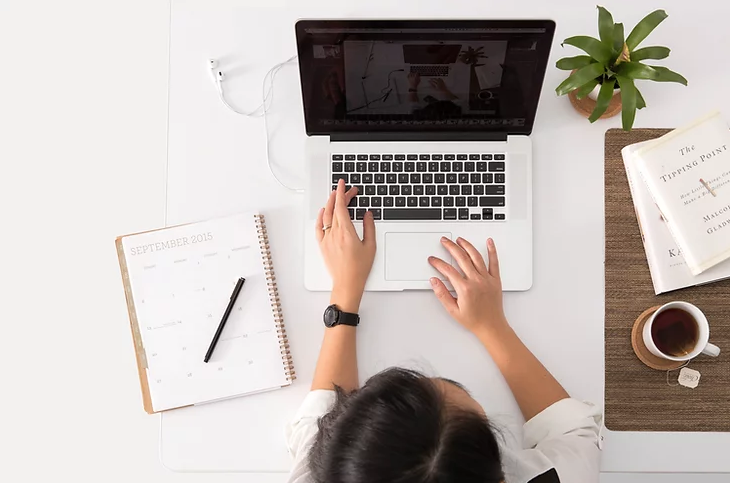
“Motivation is what gets you started. Habit is what keeps you going.” – Jim Ryun
While your morning routine sets you up for a productive day, you can also optimise your daily routines and how you spend your time during the workday. Rather than just reacting to what’s being thrown at you, productive workday habits and routines make sure you know and focus on your priorities, can block out distractions, and have a plan for getting back on track when things go awry (MacKay, 2019).
Here are 10 Ideas to help you design a routine at work
1. Ensure a clean workspace which is distractions free
If your desk is cluttered, it can make it difficult to focus on tasks. Therefore, simply clearing your desk of distractions can have a great impact on your focus and, with it, your productivity. Take five minutes to organise your workspace before you start the day.
2. Tackle the worst thing first
Start your working day by tackling the most difficult or most pressing task first, the task that will most likely encourage you to procrastinate. The benefit of this is simple. Even if you accomplish little else that day, you can be happy with the knowledge that you did something important. Also, by doing the most difficult thing first, everything else will be easier (Drmsriram, n.d.).
3. Schedule your email and IM time
Before you start your day, spend 5 minutes prioritising your e-mails. Decide what needs to be read now, and what you can afford to read later. During the workday check your e-mails every couple of hours rather than every few minutes, because frequent interruptions will impair your concentration and productivity. It is important to take at least a 2-hour break from email once a day. Think of this as your personal “office hours.” These are the times when you can communicate and collaborate (MacKay, 2019).
4. After Lunch – Carry out mundane and easy tasks
If possible, carry out mundane and easy tasks such as replying to simple e-mails a couple of hours after lunch, when your energy will naturally hit a slump. In general, as the day goes on, we lose the capacity to make lots of high-level decisions (Ho, 2020).
5. Schedule (and take) more breaks
It important to be aware of your body’s natural energy levels, as we can’t be productive all the time. Research into our changing energy levels revealed something that scientists call Ultradian Rhythms. These are 90-120 minute sessions of alertness that our mind cycles through before needing a break (Thibodeaux, 2017). According to sleep researcher Nathaniel Kleitman, our minds naturally crave breaks after every 90 minutes of intense work.
6. “Batch” similar work together
For many people their day consists of all sorts of different types of work. This kind of constant context switching kills your ability to focus and be productive. Every time your brain switches to a different task it can take up to 15 minutes for it to get back into the previous task. Try to work in 90-minute sessions so you can push distractions aside and power through your most important tasks (MacKay, 2018).
7. Drink more water during the day
Water is a miracle productivity tool. Yet most of us skip the water cooler and head for the coffee machine when we are feeling a lack of energy.
And while caffeine definitely has its place in our workday. But, drinking more water is one of the best daily routines you can build (MacKay, 2019).
8. Take a quick nap or meditate
It can be easy to forget the most important activity – resting. Humans simply aren’t built for working all day without a break. However, if you don’t consider this in your routine, there is a danger that you will lose energy and
enthusiasm all together and burn out, thereby killing your productivity altogether (Ho, 2020). One way to do this is by picking a reasonable time to stop working, another is to take a quick nap, others recommend meditation.
9. Clean Up Your Desk Before Leaving.
Allow 5 to 10 minutes each day to clear out unnecessary items and organise your desk for the next day. This will help you stay organised the following morning.
10. Finish up and off on time
A lot of people over-work because they assume that the more hours they spend at work, the more successful they will be. However, if you leave work every day on time, this ensures you have more time to do the things you need to do every day that contribute to your productivity and well-being – like sleep, relax, and even exercise.
Time management and productivity are not only about doing more. But about the most optimal way of using your time to achieve your goals. You can build healthy and productive routines that help you get the most out of life by starting small and being realistic.
Sources
Drmsriram. (n.d., January 01). PRODUCTIVITY SPECIAL… Leon’s Daily Routine for Maximum Productivity. Retrieved from http://drmsriram.blogspot.com/2018/03/productivity-special-leons-daily.html
Ho, L. (2020, October 13). Powerful Daily Routine Examples for a Healthy and High-Achieving You. Retrieved from https://www.lifehack.org/677367/powerful-daily-routine
MacKay, B. (2018, October 25). When to work: How to optimize your daily schedule for energy, motivation, and focus. Retrieved from https://blog.rescuetime.com/when-to-work-productivity-curves/
MacKay, J. (2019). The 21 Daily Routines and Habits of Highly Productive Founders and Creatives. Retrieved from https://plan.io/blog/daily-routines/
Thibodeaux, W. (2017, January 27). Why Working in 90-Minute Intervals Is Powerful for Your Body and Job, According to Science. Retrieved from https://www.inc.com/wanda-thibodeaux/why-working-in-90-minute-intervals-is-powerful-for-your-body-and-job-according-t.html